Wednesday, June 16, 2010
More Electroexecution
This is a case where the bean counters are counting the wrong beans. The metrics they used are out of touch with what's going on in the world today and the whole host of externalities that bean counters are not generally meant to measure till they are forced to. I can tell you that the dismantling of the Milwaukee Road was the dumbest thing right before an oil crisis. He who does not learn from history is doomed to repeat it. I find it interesting that these studies keep coming out decade after decade against electric transport on cost or other issues. Edison's battery for cars seemed to be taken out this way, the Milwaukee Road got taken out this way, and now the Seattle Trolley buses might get taken out this way. I want to see a diesel vs. trolley bus test up a hill. Stop the insanity.
Wednesday, September 16, 2009
Midweek Notes
~~~
Vancouver does Granny Flats in high rises.
~~~
Seattle Mayoral candidate McGinn is floating ideas for another light rail election in two years. But by light rail does he mean rapid streetcar or light metro?
~~~
A dustup over trolley buses in Seattle. I'd be interested to see if the bean counters actually did a lifecycle analysis considering how long electric trolleybuses actually last. Anyone who takes away existing hydro powered transit and replaces it with diesel needs a head check. It's unfortunate that it is even being discussed at all.
~~~
The economy isn't being so kind to mixed use projects in Atlanta.
Wednesday, May 13, 2009
On the Coalition of Sustainable Transport
For the rest of you: what's your excuse? Why would you continue to rely on such wasteful and expensive transportation options — a label that applies to both cars and buses — when you could use the most efficient vehicle ever invented?First off, a bus is nowhere near as wasteful as a car, especially here in San Francisco where many of our transit lines are electric and powered by hydro plants as well as packed to the brim with riders. Second, while I really love the fog in San Francisco, it's like the humidity in Houston that uses moisture to boil you alive, but instead chills you to the bone. It's not hard to wonder on a cold rainy day why someone might want to have the option of taking Muni. Transportation should be multi-modal to give people options. If we start to think our mode is the best for everything, we're no better than highway engineers and the sprawlagists.
I understand that it was probably supposed to be a rhetorical question, but I'd like to think we're in this together against the car culture that keeps modes of more efficient transportation from thriving. Perhaps many cyclists share this feeling, that Muni is not needed, however I believe that would be a dangerous mistake to make, and bust up a winning coalition that seems to have cars on the ropes, even if we do suffer setbacks such as today's budget fail.
Tuesday, March 17, 2009
Appreciating Bus Drivers
Monday, March 16, 2009
Electric Surge
Automakers envision electric cars as a solution to gas price jumps. Environmentalists see bluer skies. And electric utilities? They could be the biggest winners of all.Seems to me electric utilities could be even bigger winners if they built electric transit networks. Then we wouldn't be sending our money to companies that provide diesel but rather the local power company, which hopefully has a smart grid linked to alternative energy. But its better than breathing the diesel fumes even now.
Sunday, March 15, 2009
Incentivizing Clean Energy Consumption
What a great idea: incentivize ( I hate the 'word,' but it's descriptive) consumers to install wind and solar power equipment by paying them a premium for the power generated.It got me to thinking, what if the FTA incentivized cleaner transit such as trolley buses making the replacement cost to transit agencies lower if they or the utility build the infrastructure. It seems to me that allowing transit agencies just to replace with diesel buses because they are a bit cheaper is looking only at the short term benefits instead of the long term. Anyways, just thoughts.
Thursday, February 26, 2009
Vintage Trolley Bus
Extra: If you don't have a ROW, run your tram on the ice.
Sunday, January 11, 2009
A Clean Urban Ring?
Saturday, November 15, 2008
Transportmakers
Another should be looking into the possibility of building bus, light rail, and passenger train cars(including HSR). Now this might or might not be such a good idea seeing as the last time Boeing tried this the vehicles they created were lemons. But its worth exploring. If we want to think seriously about expanding transit capacity, we need to do something to speed up production. I have a feeling that siemens and other makers aren't going to be able to keep up with the demand that is coming.
But Mr. Udall recognized that the country could not afford the economic consequences of losing all of the automobile industry’s jobs and profits. He proposed that the auto companies branch out into “exciting new variants of ground transportation” to produce minibuses, “people movers,” urban mass transit and high-speed intercity trains. Instead of expanding the Interstate highway system, he suggested that the road construction industry take on “huge new programs to construct mass transit systems.” And he called for building “more compact, sensitively planned communities” rather than continuing urban sprawl.Glad he's thinking not just about the transport system but the land use that feeds it.
Thursday, June 19, 2008
Edmonton Council Ditch Trolleybuses, Are Shortsighted
Obviously no one was looking into it. And apparently, the 7 of 13 council members are into spewing more particulates into the air. When are we going to get serious about air quality. I must say I appreciate the Muni lines that have electric wires. When I'm walking on the street, I don't feel like I'm breathing dead dinosaur.
Monday, June 16, 2008
Yosemite's Relation to Transit
On the first day we went to Yosemite Valley. If you haven't been I certainly recommend it. It's stunningly beautiful and made me wish that I could still run twenty miles at a time, specifically during this picture...
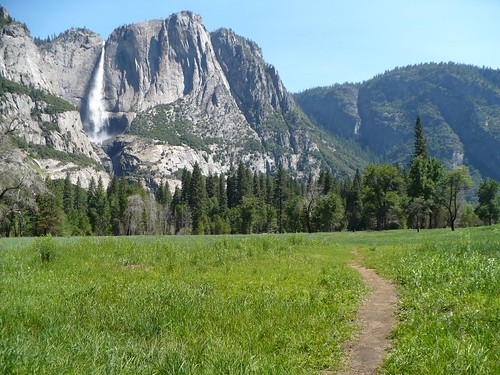
After the meadow, we drove to a parking lot and left our car. We hopped on the bus and it took us to a trail head for mirror lake. It was amazing and we got a good view of the lake's reflection of the mountains.

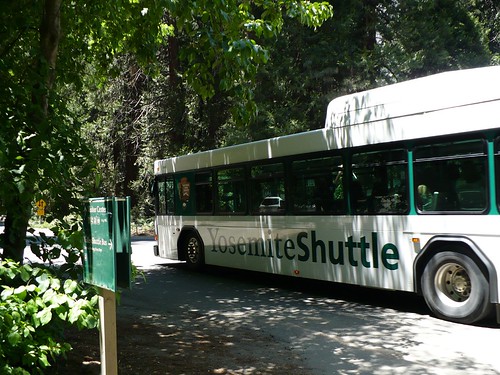
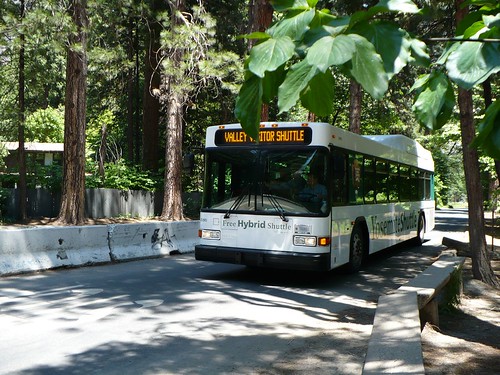
The next day we went to Hetch Hetchy, where San Francisco gets its water. Down stream that water gets turned into hydroelectric power for Muni Metro and trolleybuses. You'll have to turn your screen sideways for the video of Wampama falls.
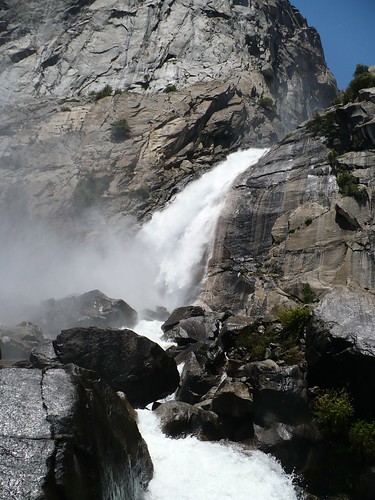
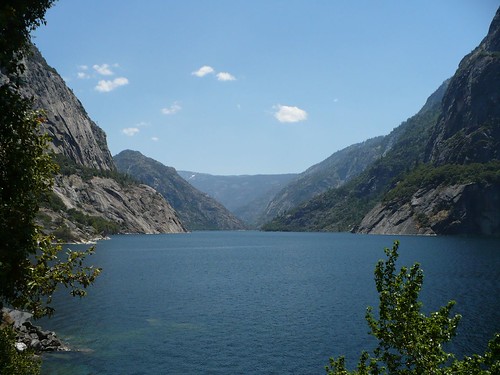
All in all it was a fun trip.
Thursday, May 29, 2008
The Gasoline Conundrum
When does the price of gasoline get so painful that drivers park their cars and look for the nearest bus stop or rail station? Many in North Texas say that time has arrived. And a new study of driver attitudes – plus increasingly crowded buses, trains and station parking lots – suggests they may be right.There is one of these...
High gas prices are pushing more people onto buses and subways, straining transit agencies trying to meet the demand.Like other consumers, the agencies are also paying more for fuel — 44% more this year than last, according to a survey of 96 transit agencies to be released Friday by the American Public Transportation Association (APTA).That double hit means bus and train operators are raising fares, cutting services and delaying improvements. Almost half of bus operators and more than two-thirds of rail operators have increased fares. About a fifth are cutting service.
These aren't choices we should have to make and its unfortunate that our the majority of our transportation system is tied up in oil. It'll be interesting to see how resources shift as prices go up. Will fund transit with higher fares as some have already started to or will it come out of a budget for new roads. The paradigms are shifting, but perhaps not that much.
For the future, when the grid starts to get changed into alternative energy like solar, part of the capital program for smaller cities might include provisions for electrification of heavier ridership bus lines. Now that oil and diesel prices are so high, it's possible to pay off some of the capital cost over time of this incremental improvement. Since this would include some smaller cities, it would be a great opportunity to include more areas into capital funding programs. It certainly would make more lawmakers happy that they are serving their constituents and make available funding from a carbon economy.